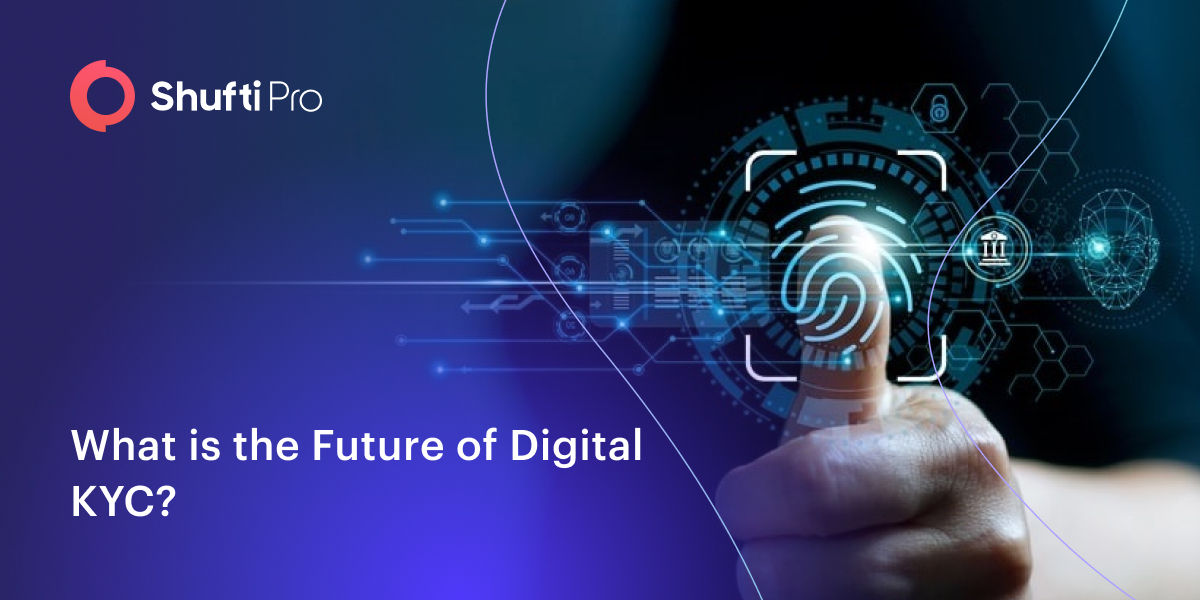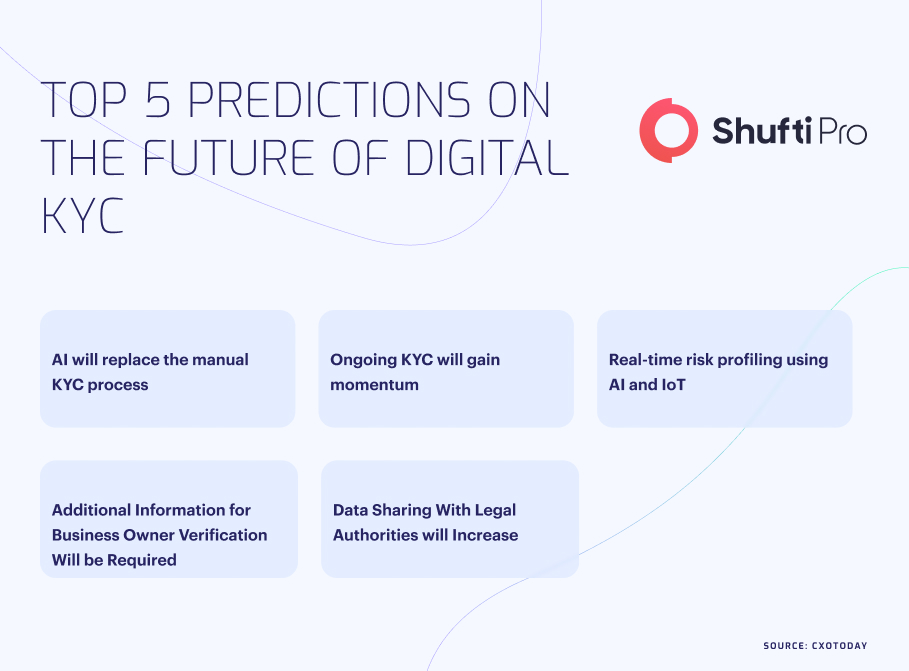5 Predictions on the Future of Digital KYC and eKYC

It’s 2023. Welcome to the day and age of digital KYC verification. From multiple copies of ID cards, driver’s licences, and signatures to one single, unified biometric verification method, KYC authentication has come a long way.
While the provision services are going digital, it is inevitable that KYC (Know Your Customer) will go digital too. With the current state of adaptation, we can’t resist but ask, “what will be the future of digital KYC?”
As digital finance evolves, AML (Anti Money Laundering) laws and KYC also need to keep up with the pace of innovation. Historically, AML laws have mostly lagged behind criminal activity. However, businesses may soon see this changing. What are the top predictions on the future of digital KYC and where do we go from here? Let’s discuss.
1. Automation will Take Over Manual KYC Processes
Artificial intelligence and machine learning will continue its momentum to overtake manual, laborious and repetitive KYC tasks that otherwise consume a big chunk of time and effort. Fintechs, banks, cryptocurrency exchanges and IT security service providers have already started implementing AI-based KYC solutions for Customer Due Diligence (CDD).
How can AI detect the authenticity of the document? By analysing the document against a number of criteria, such as:
- Font size
- Spacing between words and sentences
- Identifying morphed images
- Checking document expiry
- Identifying photoshopped documents
- Identifying fake unique identifier numbers
- Checking deepfakes
Machine learning will continue helping companies in preventing fraudulent activity.

2. Ongoing KYC will Become a Part of AML Compliance
Some individuals and business entities will always carry more risk than others. In this case, a one-time KYC for onboarding high-risk entities may not be enough, which is why ongoing KYC will become an integral part of minimising risks. High-risk customers such as PEPs (Politically Exposed Persons) need to be reviewed every year as compared to a three-year or a five-year KYC period for medium-risk and low-risk customers, respectively.
Instead of ongoing manual KYC, the automated method automatically highlights potential red flags associated with suspicious activities, such as:
- Unusually large amounts of transactions
- Change in business ownership
- Conducting businesses with high-risk countries and companies
Suspicious activities will help companies determine the ongoing risks associated should they continue working with high-risk businesses and entities.
3. Real-time risk profiling using AI and IoT
The Internet of Things, or IoT, is a system of interconnected physical devices with sensors and software that help in sharing data with other devices. While still in its infancy stages of development, it will soon become the foundation of everything we do digitally.
With a CAGR of 25%, the IoT market has just started. Add in artificial intelligence and machine learning, it will take digital KYC to a whole new level. Banks, fintechs and other services will use IoT to further save time and money in developing digital customer personas and monitoring financial behaviour in real-time.
It will further help companies in customer risk profiling to mitigate fraudulent activities.
4. Additional Information on Business Ownership Will Be Required
The US Corporate Transparency Act of 2021 with Final Updates has made one thing clear: beneficial owners of companies being registered in the US can no longer remain anonymous. ID verification and ownership details will now be required as per swift changes in regulations.
However, contrary to this, unidentified business owners (UBOs) still remain a big part of the KYC problem. There is often limited information on business ownership, becoming an obstacle in efficient KYC processes.
Some countries that are known to be tax haven, such as Luxembourg, British Virgin Islands and Panama, may take some time to comply with regulatory changes. In the near future, governments will share owner beneficiary information to strengthen and comply with the KYC procedures.
5. More data sharing
Last but not least, in the near future, data sharing with regulatory and law enforcement agencies will only keep on increasing. Many countries worldwide have made it mandatory for businesses of all sizes to share data on the companies and individuals they are working with. This is all done in an attempt to mitigate fraud, and avoid hefty penalties on money laundering.
As AI makes digital KYC verification more efficient, it will expedite the process of customer onboarding and data sharing.
How will KYC Banking change?
Banking is one of the core businesses requiring a strong eKYC model to detect and mitigate fraudulent attempts. Till date, customers would have had to provide their ID documents, alongside its photocopies, and visit the branch in person for verification. Not only was this a hassle, a number of times, but customers would also get agitated due to missing documents for KYC.
But not anymore with eKYC.
With digital KYC banking, brick-and-mortar banking will slowly fade away. But none of this can be achieved without strong regulation.
Conclusion
With every passing day, regulators and governments are under increasing pressure to tighten the money laundering laws to prevent financial crimes.
The Companies House in the UK is struggling to keep up with the ever-growing needs and challenges of AML and KYC laws. Verifying identities, and preventing money laundering are by no means too easy to do.
Data breaches, cyberattacks, and skyrocketing cases of ransomware incidents are leading to mounting pressure on regulators to ensure effective AML laws are in place.
Let Shufti help you onboard new clients using AI and ML to understand customer behaviour, develop risk profiles and monitor ongoing KYC.
Every company should aim to reduce false positives and minimise the chances of fraud should be every company’s aim whilst implementing digital KYC verification processes. With a process of verifying entities against 1,700+ sanctions lists, Shufti’s dedicated compliance experts are here to assist you in remaining compliant.











